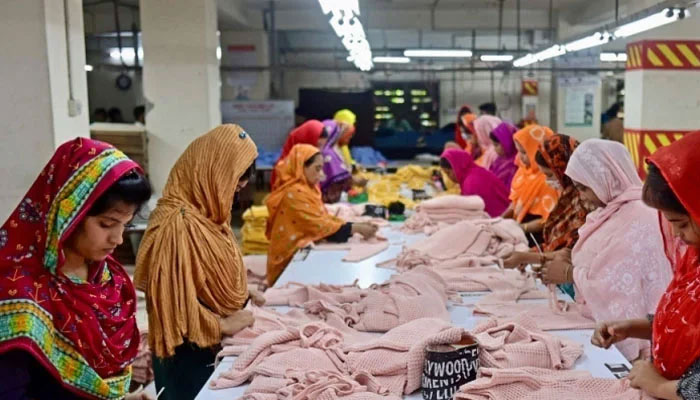When tensions rise and tariffs bite
LAHORE: India will feel the greater pinch from the Trump tariff war as it is far more integrated into the US economy. Pakistan, which exports less overall to the US (mainly textiles), will also suffer as slowing global trade pressures price-sensitive buyers, potentially hurting Pakistan’s textile margins.
The war hysteria created in the region would be detrimental to the economies of both countries. India recorded a merchandise trade deficit of $21.94 billion in December 2024, slightly improving from a record low of $37.84 billion in November 2024. However, its trade deficit with China widened to a record $99.2 billion in the 2024/25 fiscal year, driven by increased imports of electronics and consumer goods. India’s services sector continues to provide a significant buffer, recording a surplus of $171.69 billion between April 2024 and February 2025, up from $149.34 billion during the same period a year earlier. Combining goods and services, India’s overall trade deficit stood at approximately $94.26 billion in 2024.
It is India’s services sector that would suffer the most if the US imposes additional tariffs. Bilateral trade between India and the US totalled $129.2 billion, with US exports to India at $41.8 billion and imports from India at approximately $87.4 billion, resulting in a US trade deficit of about $47.7 billion with India.
Pakistan’s trade deficit narrowed to $13.2 billion in the first seven months of FY2024, a 33 per cent reduction compared to the previous year. However, in December 2024, the monthly trade deficit widened to $2.4 billion as imports exceeded $5 billion for the first time in two years. Pakistan recorded a current account surplus of $699 million in the first quarter of 2025, indicating some improvement in external balances.
In 2024, total bilateral trade between the US and Pakistan stood at $7.3 billion. The US exported goods worth around $2.1 billion to Pakistan, while its imports from Pakistan were approximately $5.1 billion, resulting in a US trade deficit with Pakistan of around $3 billion. Pakistan’s trade surplus with the US is primarily driven by exports of textiles and apparel, which constitute a significant portion of its export portfolio.
When tensions rise, uncertainty follows. Investors, both local and foreign, usually react badly to uncertainty. Investment slows down; people wait instead of putting money into new projects. Stock markets become volatile, and share prices can drop sharply on mere rumours or threats.
Currency pressures would be more severe for Pakistan. With thinner external reserves, the rupee could weaken further, making imports more expensive.
Although Pakistan-India trade is small compared to their total global trade (around $2-3 billion annually), informal trade and strategic commodities (such as chemicals, pharmaceuticals, and cotton) could suffer. Trump’s measures would hurt Asian exporters more broadly.
As far as Pakistan and India are concerned, there will be a combined impact of tensions and tariffs. Local tensions scare investors, while global tariffs mean that even if production continues, selling abroad becomes harder. Risk premiums rise, and both countries might find it more expensive to borrow internationally.
If tensions persist, governments are likely to prioritise military budgets over development spending, leading to setbacks in education, health and infrastructure.Pakistan is relatively more vulnerable because its economy is smaller, less diversified, and its external accounts are weaker. India, while also affected -- particularly in stock markets and exports -- has a larger internal market, providing some degree of cushioning.
-
 All You Need To Know Guide To Rosacea
All You Need To Know Guide To Rosacea -
 Princess Diana's Brother 'handed Over' Althorp House To Marion And Her Family
Princess Diana's Brother 'handed Over' Althorp House To Marion And Her Family -
 Trump Mobile T1 Phone Resurfaces With New Specs, Higher Price
Trump Mobile T1 Phone Resurfaces With New Specs, Higher Price -
 Factory Explosion In North China Leaves Eight Dead
Factory Explosion In North China Leaves Eight Dead -
 Blac Chyna Opens Up About Her Kids: ‘Disturb Their Inner Child'
Blac Chyna Opens Up About Her Kids: ‘Disturb Their Inner Child' -
 Winter Olympics 2026: Milan Protestors Rally Against The Games As Environmentally, Economically ‘unsustainable’
Winter Olympics 2026: Milan Protestors Rally Against The Games As Environmentally, Economically ‘unsustainable’ -
 How Long Is The Super Bowl? Average Game Time And Halftime Show Explained
How Long Is The Super Bowl? Average Game Time And Halftime Show Explained -
 Natasha Bure Makes Stunning Confession About Her Marriage To Bradley Steven Perry
Natasha Bure Makes Stunning Confession About Her Marriage To Bradley Steven Perry -
 ChatGPT Caricature Prompts Are Going Viral. Here’s List You Must Try
ChatGPT Caricature Prompts Are Going Viral. Here’s List You Must Try -
 James Pearce Jr. Arrested In Florida After Alleged Domestic Dispute, Falcons Respond
James Pearce Jr. Arrested In Florida After Alleged Domestic Dispute, Falcons Respond -
 Cavaliers Vs Kings: James Harden Shines Late In Cleveland Debut Win
Cavaliers Vs Kings: James Harden Shines Late In Cleveland Debut Win -
 2026 Winter Olympics Snowboarding: Su Yiming Wins Bronze And Completes Medal Set
2026 Winter Olympics Snowboarding: Su Yiming Wins Bronze And Completes Medal Set -
 Trump Hosts Honduran President Nasry Asfura At Mar-a-Lago To Discuss Trade, Security
Trump Hosts Honduran President Nasry Asfura At Mar-a-Lago To Discuss Trade, Security -
 Cuba-Canada Travel Advisory Raises Concerns As Visitor Numbers Decline
Cuba-Canada Travel Advisory Raises Concerns As Visitor Numbers Decline -
 Anthropic Buys 'Super Bowl' Ads To Slam OpenAI’s ChatGPT Ad Strategy
Anthropic Buys 'Super Bowl' Ads To Slam OpenAI’s ChatGPT Ad Strategy -
 Prevent Cancer With These Simple Lifestyle Changes
Prevent Cancer With These Simple Lifestyle Changes




